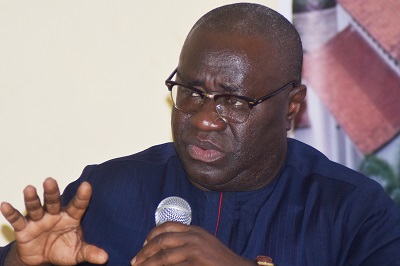Security analyst Prof. Kwesi Aning has criticised the decision to let those who pose existential threats to the state go unpunished will only embolden transnational criminal networks and undermine national security efforts.
Speaking on Joy News’ PM Express on Tuesday, April 8, he criticised what he described as the state’s failure to enforce its laws, particularly in the fight against illegal mining and foreign-led criminal activity.
“It’s not going to work,” Prof Aning said.
“And it’s not going to work because… when you give a free pass to foreigners who commit existential threats to your state, and you tell them to go free without prosecution… then you are basically cutting your nose to spite your face.”
He pointed directly to the failure to enforce or update critical legislation such as the Minerals and Mining Act, 2006 (Act 703), and its amendment, Act 995 of 2009, as a sign that Ghana is not taking the threat seriously. According to Dr. Aning, without decisive legal and prosecutorial action, Ghana will remain vulnerable to exploitation.
The security expert’s remarks come at a time of renewed government attention on illegal mining—popularly known as “galamsey”—which has ravaged Ghana’s environment and water bodies, and is increasingly tied to complex foreign networks.
Referencing President Mahama’s recent State of the Nation Address, Prof Aning noted that even the President had acknowledged the national security threat posed by illegal mining.
“If you read the President’s address and the Lands Minister’s follow-up speech, the urgency is clear,” he stressed.
“This is being treated as a matter of emergency. There’s a reason police commanders are being reshuffled. But what good is urgency if it isn’t backed by consequence?”
For Prof. Aning, this isn’t merely an environmental issue—it is a matter of national survival.
“You don’t treat people who pose an existential threat to your country with kid gloves,” he declared.
“We are working around the clock, 24 hours a day, yet the legal framework and political will to prosecute these crimes remain weak.”
His comments are the latest in a chorus of expert opinions calling for harsher penalties and proper enforcement of Ghana’s laws against illegal mining and foreign encroachment.
He warned that failing to act decisively now could make Ghana a hotspot for wider criminal activities, including illicit trade, money laundering, and terrorism financing.
“When criminals realise there are no consequences, they build networks. And those networks become harder and harder to dismantle,” he said.
“This is how transnational threats are born—through local inaction.”
Prof. Aning’s appeal was not just to law enforcement, but to the entire political establishment.
“The laws are there. The danger is known. What’s left is the will to act. And time is running out.”
Latest Stories
-
Congo, M23 rebels plan return to Qatar talks amid Trump pressure
2 hours -
US, Colombia recall their ambassadors in diplomatic tussle
2 hours -
‘It’s a joke’: Peruvians outraged after president doubles her salary
3 hours -
Putin tells Trump he won’t back down from goals in Ukraine, Kremlin says
3 hours -
Boxer Julio Cesar Chavez Jr arrested by US immigration
3 hours -
Over 100 former senior officials warn against planned staff cuts at US State Department
3 hours -
Dagbang overlord bans celebration of 2025 fire festival in Tamale
3 hours -
BBC senior staff told to ‘step back’ from duties following row
3 hours -
North Tongu DCE urges trust in gov’t as flood victims awaits compensation
3 hours -
2 arrested for murder of Lebanese national in East Legon
4 hours -
NSMQ 2025: GSTS clinch Western Regional Championship to book spot at national
4 hours -
New Supreme Court judges pledge fairness, acknowledge family support
4 hours -
Kilmar Ábrego García alleges torture and abuse in El Salvador prison
4 hours -
Gov’t sets up committee to investigate sale of state lands, including those owned by schools
4 hours -
Angélique Kidjo first black African to get Hollywood Walk of Fame star
4 hours

